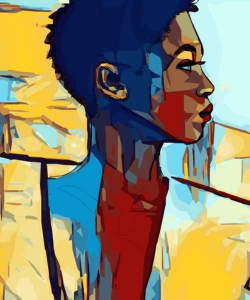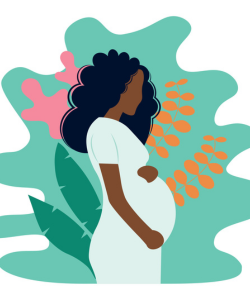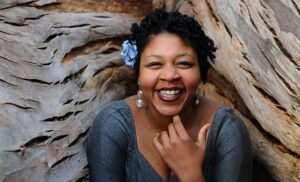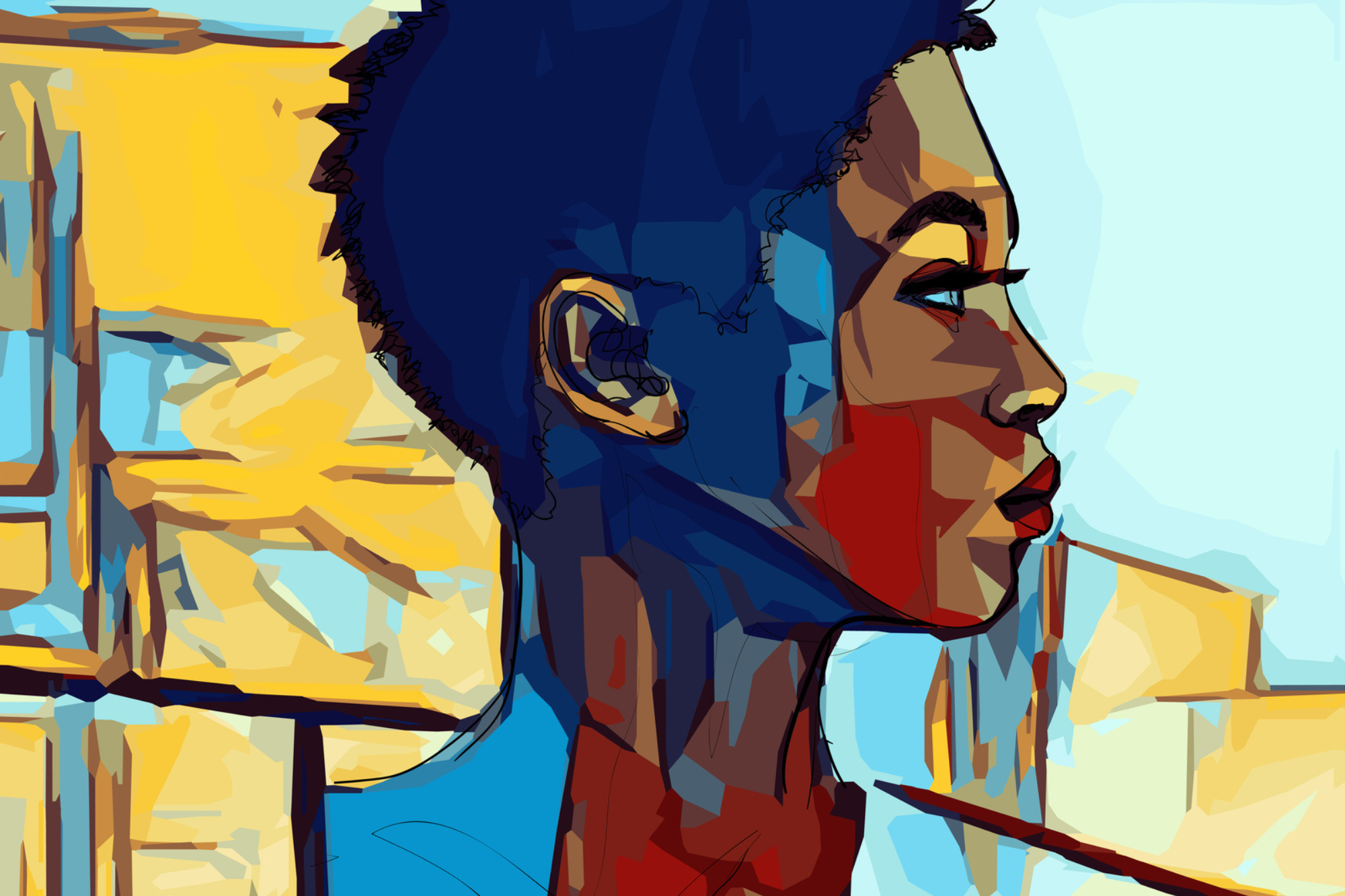 Amber McZeal is a Ph.D. graduate from the Community, Liberation, Indigenous, and Ecological depth psychology program at Pacifica, as well as being the founder of the Decolonizing the Psyche organization. I am delighted to be speaking with her today.
Amber McZeal is a Ph.D. graduate from the Community, Liberation, Indigenous, and Ecological depth psychology program at Pacifica, as well as being the founder of the Decolonizing the Psyche organization. I am delighted to be speaking with her today.
Angela: You first came to Pacifica in 2013, for your M.A. in Depth Psychology with Specialization in Somatic Studies, and from there you pursued your Ph. D. in our CLIE program. What drew you to Pacifica, and in particular CLIE?
Amber: I attended my undergrad at Goddard College in Vermont and it has a transformative pedagogy with self-directed learning, so I was able to create my degree focus on sound therapy and trauma. There was a lot of somatics in that, a lot of it was neuroscience, metaphysical concepts and afro-indigenous myths. I ended up having a ton of dreams during that process of writing my undergrad thesis, so I had an appendix of 45 pages of a dream journal. I had never heard of dream tending, but was introduced to Pacifica by a cohort, Antonia C., and it seemed like a deepening of what I’d started to scratch the surface of, and I decided to apply. The focus of Somatics is about the body, and I wanted a more critical lens that incorporated the African-American body. I was really fortunate to receive support from Dr. Cally Hutter and Dr. Susan James, who invited me to transfer into the CLIE program, where I was well-met, to finish my Ph.D. The good fit was decoloniality and being introduced to decolonial theory as a critical approach to understand the ritual of othering and the ritual of creating that margin of people or even the body itself as being something other than the mind or less valuable. That was a main contribution of the program and it colored my entire dissertation. The other strong point was the emphasis on indigenous stories as a valid process. Entering into CLIE, I was given a way of articulating that valid knowledge approach to tending the inner world. It was just a good fit.
Angela: You describe yourself as a “writer, vocalist, sacred scholar, and artivist,” each of which seems like it could be a remarkable and worthy career in its own right. What catches my eye most is “artivist,” as it’s a term I haven’t heard before. Can you explain more about what this is?
Amber: It’s an allusion that puts activities and artists together. That is born out of my personal experience as a survivor of Katrina in 2005 and moving to the Bay Area in 2006 and launching my career as an activist, as a necessity of survival. I cherished my mentors and teachers there, but I found something was missing. I do stand on the shoulders of many who have used art as their form of activism. Like Sweet Honey in the Rock is an example, singing about “some of us were born on the bottom, we grew up from the bottom, and then we declared we’d never return to the bottom.” It speaks to the incorrect idea that some are expendable and some are highly prized, and reviving dignity and self-love and agency to that segment of people who have been declared expendable. I have to honor these artists who came before me.
In my own life, I’ve been working on an afro sci-fi novel, which contains songs that I’ve written about healing from these kinds of cultural traumas. So my activism doesn’t always need to take the form of community scholarship or tutelage, it can also be a super receptive posture of absorbing something creative. African characters in space and depth psychology, when I think of my own approach to science fiction, I think more about tending the stars from the earth, not necessarily African characters in space. I study astrology, so I pull that symbolism not only from the western Greek astrological mythology, but Egyptian. The other piece that comes to mind with depth psychology is that coloniality reduces the perspectives that are allowed. There is a whole tradition of Mali’s Dogon people who have a ritual with Sirius B. Somehow these people in a remote village in Mali, have performed ceremonies every 50+ years without the invention of telescopes; they’ve tracked the movement of this star and they have original myths that their people came from this star. And in the 70s, when the west developed telescopes, they were able to confirm the existence of Sirius B. Moving to more spaciousness and more wholeism requires that we bring in other myths and mixes.
 Angela: I have been reading some articles recently that talk about the disparity in quality of treatment given to African American patients vs. the treatment given to Caucasian patients, especially as it pertains to the pandemic. Your dissertation at Pacifica, “Radical Love Traditions: Exploring the Decolonial Turn in Maternal Healthcare for Black Women,” focuses on “the phenomenon of maternal mortality in the United States and the racial health disparities embedded within it, with an emphasis on racism as the root cause.” I am especially curious how depth psychology approaches this issue, and what aid it can render us in healing and resolving the disparity.
Angela: I have been reading some articles recently that talk about the disparity in quality of treatment given to African American patients vs. the treatment given to Caucasian patients, especially as it pertains to the pandemic. Your dissertation at Pacifica, “Radical Love Traditions: Exploring the Decolonial Turn in Maternal Healthcare for Black Women,” focuses on “the phenomenon of maternal mortality in the United States and the racial health disparities embedded within it, with an emphasis on racism as the root cause.” I am especially curious how depth psychology approaches this issue, and what aid it can render us in healing and resolving the disparity.
Amber: My dissertation is devoted to tending the ghosts of the institution, and this is where it intersects well with depth psychology. In my research what I found is the father of gynecology, so J. Marion Sims, who is considered the father of medicalized birthing. The emergence of what we have today was experimented and practiced and refined on the bodies of enslaved black women. In my research, talking to newly minted obgyn’s and new nurses, I learned they are still being taught that people feel pain differently based on their race. This is literally what J. Marion Sims used to justify his unethical experiments. So the ghosts of the institutions are alive and well.
Speaking to the point of cultural healing, what I gleaned is that you have a small amount of that narrative in the textbooks, all of which is based in social fallacies, but the majority of the transmission around the narrative of black women feeling pain differently is an oral tradition handed down from the elder doctors to the newer doctors and that’s the intersection of where the cultural trauma exists. So this is why we have to start at the institutional level and stop that racializing, de-humanizing narrative that is hundreds of years old. The most well-known might be Serena Williams who had to advocate over and over for her own body and her awareness of what she needed, but all of these doctors dismissed her concerns. So there is the somatic component, the assumption that women don’t know their own bodies, then there’s the racial narrative that black people don’t have the right to their own body. Those are the ghosts of the institution.
My ancestors have been in Louisiana since the 1700s, and a lot of these practices took place there, and there’s a way of birthing and revering the womb that exists prior to colonial demarcations. What CLIE offered me, after moving through the fire wall of that historical experience, was the African indigenous approach that I wove into my CLIE dissertation; it afforded me to breathe life back into a generative and life-affirming relationship to birthing people, as opposed to a dehumanizing and extractive way of birthing.
Angela: This year you’ve said you’ll be “re-launching the Decolonizing the Psyche: Decolonial Somatic Approaches series, with an emphasis on embodied praxis + theories of change—reimagining social contracts through an Indigenous and Archetypal lens” as part of the courses and workshops you offer. For anyone to whom this is a new concept. What does “decolonizing the psyche” mean and what does a depth psychological approach contribute to it?
Amber: Decolonizing is moving away from silos to more conceptual understandings. Depth psychology has that. I was invited to read the Art of Inquiry, the principles around psyche we had to learn and incorporate. Psyche, something we can’t see is real, is a radical departure from what you would call colonial logic, which is materialistic, which asserts that if you can’t see it, it isn’t real. That’s what makes CLIE really unique, because it expands what depth psychology had set out to do. Jung was on the fringe of the dominant field of psychology, bringing in the mythic and the shamanic, even though there are colonialism and racism and sexism that he wrote about, but in the context of that period of time when the field of DP emerged, he was a radical figure. So decolonial theory expands that radical element by bringing in more voices, more sensibilities.
DTP (Decolonizing The Psyche) is an experiential process that centers the cultivation of critical consciousness–C3–coupled with embodiment practices to foster transformation. These practices are intended to disrupt patterns of coloniality embedded in the psyche and body. DTP is a gesture at producing alternative conceptions of being, knowing and doing—beyond the racialized and human-centric conceptions that have distorted relationships with ourselves, with each other and with the more-than-human world.
For more of this interview, please see Part II!
Interested in Pacifica’s CLIE program? Visit us here.

Amber McZeal. Writer, vocalist, sacred scholar, and artivist, Amber utilizes sound therapy and guided somatic imagery to engage the knowledge of the body within an interactive and liberatory arts practice. In 2018, Amber launched her organization, Decolonizing the Psyche, where she weaves somatic praxis with Afro-Indigenous spiritual technologies and social justice—deep decoloniality—in efforts to end oppression and create more humane social relationships. Amber holds an M. A. in Somatic depth psychology and Ph. D. in Community, Liberation, Indigenous, and Ecological depth psychology.

Angela Borda is a writer for Pacifica Graduate Institute, as well as the editor of the Santa Barbara Literary Journal. Her work has been published in Food & Home, Peregrine, Hurricanes & Swan Songs, Delirium Corridor, Still Arts Quarterly, Danse Macabre, and is forthcoming in The Tertiary Lodger and Running Wild Anthology of Stories, Vol. 5.


